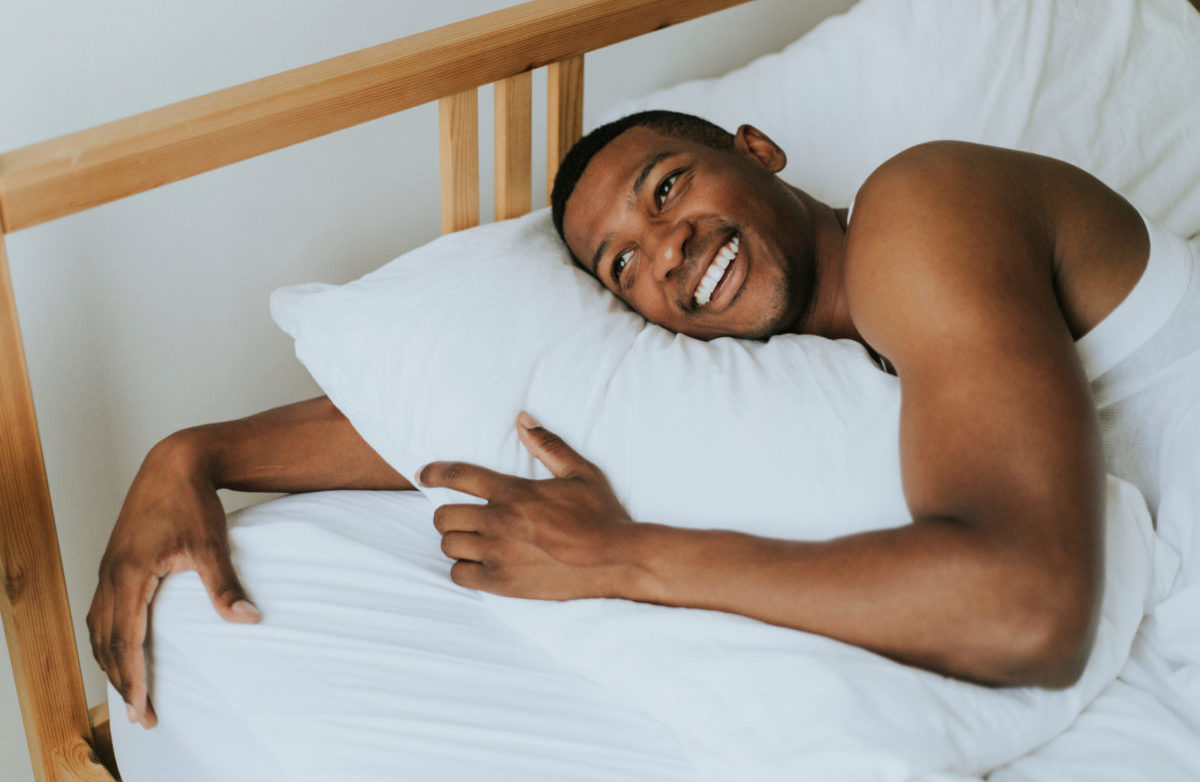Contents
Good sleep is one of the most important things we can do for our overall health, and it offers more than short-term feelings of restfulness. It actually helps regulate hormone production, improves cognitive function, reduces the risk of heart disease, lowers inflammation, and prevents depression. Not only that, but it helps maintain a healthy metabolism and body weight.
Without proper sleep, you are at risk for health conditions like heart disease, obesity, and even diabetes. Getting quality sleep should be a top priority for everyone. However, it’s not that simple for many people. Insomnia and other sleep disorders are unfortunately rampant. And even without specific conditions that make good sleep more challenging, our modern lifestyle, or athletic pursuits, may make good sleep more difficult to achieve.
According to the National Sleep Foundation, athletes may benefit from as much as ten hours of sleep at night with increased energy and speed, improved coordination, mental functioning, and performance intensity.
It can be especially challenging for athletes to sleep after a strenuous evening workout, but sleep is key for muscle recovery, not to mention improved mood and a reduction in overall fatigue.
Many people are reaching for CBD products like CBD oil to get a good night’s rest. Using CBD for sleep is growing in popularity, but actually, cannabis products have been helping people sleep for centuries. As industrialized hemp and CBD became legal at a federal level, consumers are opting for natural cannabis products to help them get the rest they need.
Historically the product most reached for use as a sleep aid has been marijuana. This is because THC has been found to help encourage good sleep, but does CBD have the same effect? How does it compare?
CBD VS. THC
Let’s start off by discussing the differences between CBD and THC. THC is the cannabinoid compound found in marijuana plants that makes the user feel intoxicated, most often met with a feeling of euphoria or deep relaxation.
While marijuana and THC are still illegal federally in the United States, however 37 states have voted to legalize medical marijuana, with 18 states allowing for adult recreational use.
CBD, on the other hand, is another type of cannabinoid compound, THC free, that can be found in hemp plants. It does not cause any sort of intoxication and is legal federally.
CBD in the United States comes primarily from industrial hemp plants, which were legalized by the 2018 Farm Bill. Hemp plants are federally regulated not to contain more than 0.3% THC, a level so low it poses no threat of intoxication.
Cannabis products are being studied for numerous health benefits, including therapeutic effects on sleep.
STUDIES ON CBD FOR SLEEP
Can CBD help you get a good night’s sleep? Yes – studies suggest that CBD for sleep is effective in numerous ways.
Some of the ways that CBD may be able to help your sleep is by improving anxiety, insomnia, narcolepsy, and sleep apnea.
A recent study in 2019 of 72 adults looked at patients who suffered from anxiety and chronically poor sleep. Participants were given doses ranging from 25–175 mg. For anxiety, 25 mg was found to be the most effective, while higher doses were required to help with sleep difficulties. Researchers found that two-thirds of participants claimed CBD improved their sleep and anxiety after a month of use.
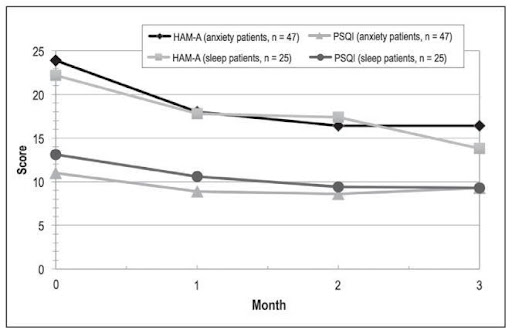
This same study showed that anxiety was reduced by 80%, which is significant because anxiety indirectly causes poor sleep. CBD also reduced cortisol (the stress hormone) levels, showing mild sedative effects.
A 2012 study supported these findings and showed that 160 mg CBD helped induce quality sleep compared to the placebo.
This 2014 review showed that “CBD may hold promise for REM sleep behavior disorder and excessive daytime sleepiness”.
In addition, a 2018 review demonstrated that CBD can treat chronic pain. This is significant because pain can cause insomnia and make it challenging to get consistent quality rest.
One pre-clinical trial on the prescription cannabis-based drug Kanabo found encouraging results with a THC:CBD mixture. This study looked at the effectiveness of varying compositions of active ingredients in cannabis that induce sleep. These were compared to Diazepam, the active ingredient in Valium. This graph demonstrated the relative effectiveness of the THC:CBD compound compared to its pharmaceutical equivalent:
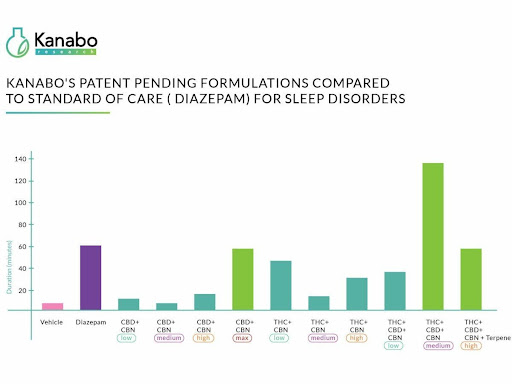
More human studies are needed, and luckily, as cannabis becomes legal in more places, further studies are being conducted. CBD has few known side effects and associated risks, so many people are experimenting with using CBD oil for sleep and CBD gummies for sleep with great results.
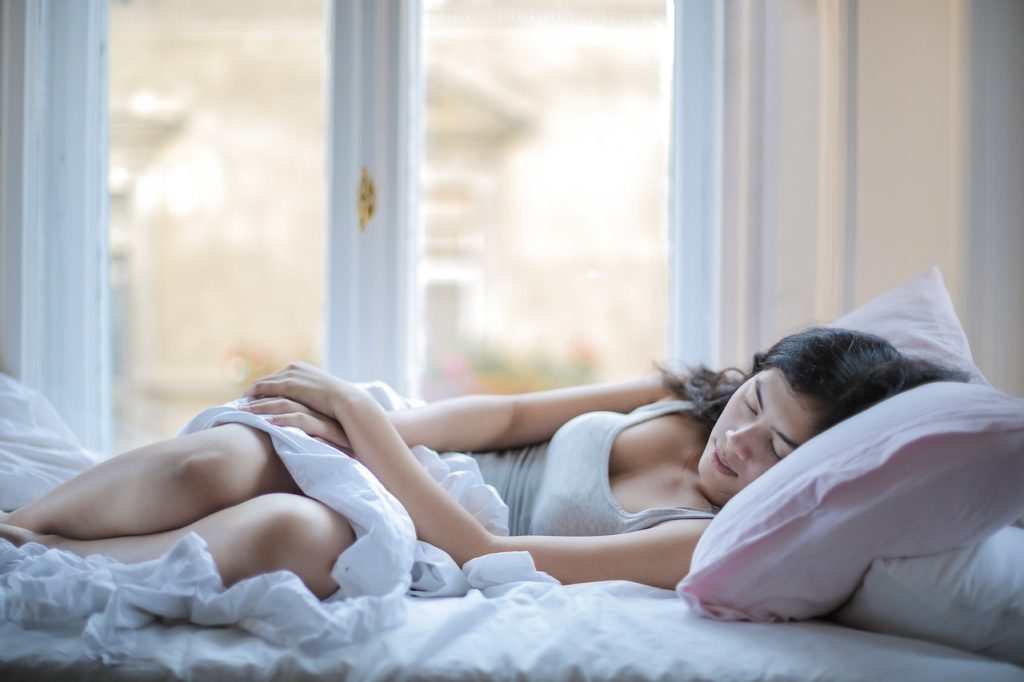
BENEFITS OF CBD FOR SLEEP
CBD allows the body to use its own endocannabinoids more effectively, and its effect on the body’s peripheral and central nervous systems, along with the immune system, means it can help with a wide variety of physical benefits.
Some research has shown that the success of CBD as a sleep aid comes directly from its success as an anti-anxiety therapy. One particular case studied psychiatric patients who were having a difficult time dealing with anxiety and were therefore experiencing sleep issues.
When adding CBD to their normal treatment, anxiety in this study’s patients decreased by 80% in the first 30 days, with almost 70% of the participants improving their sleep overall. These are strong numbers that go a long way to show the power of CBD to help sleeplessness, especially as it relates to stress and anxiety.
Because it’s such a powerful remedy for stress and anxiety, CBD users often find themselves falling asleep more quickly than they are able to without supplemental aid. It has also been shown to be helpful for those struggling to fall asleep because of pain, PTSD, or nervous system conditions, as the cannabinoids help relieve the troublesome symptoms (source).
CBD FOR SLEEP: ATHLETES
Because CBD helps with so many bodily systems, it’s particularly helpful for athletes. In addition to supporting muscle recovery, reducing injury risk, minimizing athletic performance anxiety, and reducing inflammation, it also helps induce sleep.
Sleep is important for everyone, but it’s especially true for athletes. Without adequate rest, you cannot recover between workouts, which means you aren’t getting the maximum benefit from your training.
Plus, inadequate rest makes you more prone to injury and anxiety. Injuries can set back your training months or even years. Anyone who has experienced anxiety knows how it can impact your ability to perform at your full potential.
The more rested you are, the more alert you are with improved reflexes, decision-making, reaction time, and muscle coordination.
Intense training, especially in the evening, can make it challenging to fall asleep. In addition, if you travel far to competitions, jet lag can also disrupt your sleep. To perform at your best, you need to minimize fatigue and sleep disruptions as much as possible.
CBD can help athletes prepare for and recover from athletic events in many ways, and its sleep support is one of the biggest perks. With the amount of thought and effort athletes put into training, there is too much on the line not to consider adding CBD into your supplement routine.
USE OF CBD FOR SLEEP
CBD is making a name for itself because of its therapeutic benefits. It seems that with every day that passes, CBD hits more and more mainstream outlets. You’ve likely seen it everywhere, from your local grocery store to the pet groomer.
In fact, 33% of Americans have now tried CBD. But how well does it work for something like sleep, which is complex but essential to the overall health and well-being of people everywhere?
A recent survey found that 10% of respondents used CBD oil for sleep, with most of them claiming it worked well for their purposes.
In light of this, there are several factors to consider when investigating CBD for sleep. First, CBD contains a terpene called myrcene. This particular terpene is known to act as a sedative and is a powerful addition to cannabidiol (CBD). An interesting fact to note is that myrcene has been used for centuries as a sleep aid, mostly in the form of hops which also contain high levels of terpene (more on that later).
If you are keen to try CBD, CBD gummies and CBD oil are a great place to start (more on that below). CBD gummies for sleep and anxiety are a beginner-friendly CBD product, so they might be a good solution for someone who doesn’t have much experience with CBD. Ensure you purchase high-quality CBD products, as some retailers sell products with unreliable ingredients and dosages.
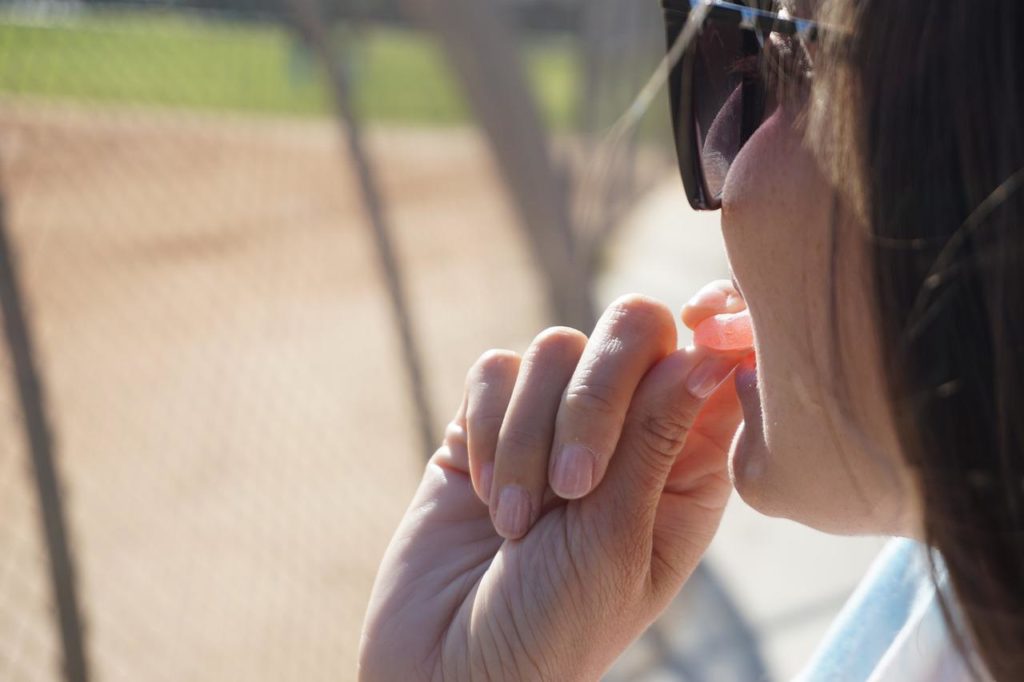
CBD OIL FOR SLEEP
CBD oils are a convenient, discreet way to consume your CBD products.
How to use CBD oil for sleep? CBD oil is a broad term used for a large number of different products that could also be described as CBD extracts. This can often make it confusing when shopping for CBD products as you will likely come across CBD oil in many different forms. Some of the most popular are:
Tinctures
CBD tinctures are pure liquid extracts that are generally applied under the tongue. By adding a few drops under the tongue, the CBD oil is quickly absorbed into the body and enters the bloodstream.
These products are usually sold in a glass bottle with an included dropper built into the lid. The packaging makes it easy to measure dosing.
Capsules
CBD capsules are filled with pure CBD oil and swallowed just like any other nutritional supplement. You’ll usually find these products packaged in bottles similar to what you’d see for vitamins or other supplements. The gel tabs will most often be clear, with only the golden oil being visible inside.
Rick Simpson Oil (RSO)
This very specific type of oil refers to an alcohol-based extract that is either ingested or applied directly to the skin. This product usually comes packaged in a plastic plunger or some sort of similar applicator.
Vape Oil
This can commonly be found in either pre-filled oil cartridges that attach directly to the battery of the vaporizer or also as a vape juice that is used in e-cigarettes.
Dabbable CBD Oil
This is a slightly different and newer form of CBD oil that includes butane hash oil that is rich with CBD, live resins, and rosin.
To use dabbable CBD, one has to learn a somewhat complicated flash vaporization process called “dabbing.” If you’re just putting your toes into the world of CBD, this is probably not a product you’ll want to start with, but it’s good to have a general understanding of this CBD product.
ISOLATE OR FULL SPECTRUM?
We recommend a CBD isolate instead of a full spectrum CBD product. CBD isolate is the purest form of CBD with no other compounds from the cannabis plant. There are no other cannabinoids, terpenes, or miscellaneous compounds found within.
CBD in the isolate form is typically derived from hemp plants which contain only trace amounts of THC. CBD isolate is a crystal which can be ground and used in numerous applications.
Isolate goes through a more intensive process to remove all extra components, leaving only pure, isolated CBD. This product will almost always come from a hemp plant and is, therefore, legal throughout the country.
As the purest form of CBD, isolate is great for first-time CBD users who want to try it on its own, without the intrusion of other cannabis compounds.
With isolate, you can take a higher dosage, offering more pain relief without worrying about increasing levels of THC.
Also, because CBD isolate is purified, it contains no taste or odor.
HOW MANY MG OF CBD PER DOSE SHOULD I TAKE?
There isn’t one correct CBD dosage that works for everyone. The right dosage of CBD will depend on your individual body and needs. Everyone’s body metabolizes it slightly differently, so you need to experiment to find the right amount for you.
It’s common for people to consume between 10-50 mg CBD per day in total. However, some studies even have people taking up to 1500 mg in a day!
One thing to consider is that while CBD oil won’t get you high, it can have some other effects on your body. For instance, it’s not uncommon for users to feel physical relaxation, stress relief, or even a slightly alert or sedative effect. Each individual’s reaction will depend on their own unique biology, dosage, and how they choose to ingest it.
Many CBD gummies contain 25 mg CBD per serving. 25 mg per day is a good starting point; you can try out a daily gummy and adjust the dosage as necessary.
CHOOSING A CBD PRODUCT
What should you look for when choosing a CBD product?
It’s important to know that not all products are created equal. There are some low-quality CBD products on the market. If you purchase low-quality CBD oil, there is a higher chance that the THC levels will be beyond what is considered the safe zone for non-intoxication. So before introducing CBD for pain into your pain management routine, ensure you do your homework.
Besides risking the psychoactive high, you could also be risking a drug test coming back positive for THC. This is a huge problem for athletes, who may need to take drug tests as a routine of the competition. Legally, CBD products should not contain more than 0.3% THC.
If you wish to purchase the best CBD oil for anxiety and sleep in the USA, we recommend ensuring your CBD extract is tested by a third-party ISO-certified laboratory. If you need any guidance on the right products for you, MojaveRx is happy to guide you.
OTHER NATURAL SLEEP REMEDIES
If you’re really looking to naturally boost the power of CBD, there are some natural remedies that can be combined with CBD products in order to increase the effectiveness.
Some of these natural sleep aids also contain important terpenes that are found in cannabis, but in much higher concentrations than what CBD offers. Adding these to a CBD routine can greatly increase the efficacy of each product.
- Hops: Commonly known for their use in beer to produce the bitter flavor, they are actually the female flowers of the hop plant. Hops have a long history of being used in herbal medicine for a variety of ailments, including as a sleep aid. Funnily enough, this discovery came after field workers who tended hop crops would often fall asleep on the job. Centuries later, however, there is no scientific evidence to prove that hops have sedative properties, mostly due to bitter resins and the terpene myrcenol.
- Chamomile: One of the oldest medicinal plants in the world, chamomile has long been used for a number of ailments. Chamomile flowers are typically dried and used in tea for pain, inflammation, and sleep disorders. Like cannabis, chamomile contains a number of beneficial terpenoids and flavonoids [source].
- Lavender: Yet another plant that has been used medicinally for centuries, lavender has a long history of treating infections, burns, and of course, sleep conditions. Lavender oil is typically used as a topical treatment, and research has shown CBD to be beneficial in treating insomnia, particularly in females and young adults.
- Valerian Root: Another ancient medicinal plant, valerian root, has been used by generations of people to promote relaxation and improve sleep. While its flowers were used to make perfume, it was the root of the valerian plant that held all the therapeutic benefits. Valerian root holds a variety of beneficial antioxidants that have been shown to help people treat those suffering from insomnia. One such study found participants reported falling asleep 36% faster and that their overall time in a deep sleep increased during the 14 days they took valerian.
- Melatonin: This is actually a hormone from the pineal gland in the middle of the brain that is produced naturally by the body. As you might have guessed, its purpose is tightly bound to our ability to sleep. Melatonin regulates our body’s response to light, being released by the pineal gland when it’s dark [source]. You’ve probably heard the best way to fall asleep is by limiting the amount of light you’re exposed to around bedtime. Well, melatonin is the reason for that. Melatonin supplements are available over the counter, but you should check with your doctor before adding them to your treatment plan. You can also try CBD and melatonin for sleep if you experience insomnia, but make sure to consult your doctor before administering the supplements.
- 5-HTP: Much like melatonin, 5-HTP (5-Hydroxytryptophan) is a naturally-occurring compound in our bodies, in particular, an amino acid. Our bodies use 5-HTP to produce serotonin, which sends signals between nerve cells. When serotonin levels get too low, people will often suffer from depression, anxiety, and sleep disorders. For sleep, the added serotonin gets converted to melatonin, which then helps regulate the sleep cycle. A recent study showed that 5-HTP helped reduce the time it took to fall asleep, increased the duration of sleep, and improved overall sleep quality.
FAQs
Does CBD help you sleep better?
There are some studies that suggest CBD may prove to be effective in supporting quality night rest. For example, in one study, participants experienced lower cortisol levels after taking CBD. Cortisol is commonly known as the stress hormone. High levels of cortisol promote insomnia and difficulties with falling asleep, and in the study, 300 to 600 mg of CBD oil was enough for participants to experience a decrease in the hormone.
We still need more information about how CBD influences sleep, but research results are promising.
When should I take CBD for better sleep?
Every organism metabolizes CBD differently, so the time needed for CBD to be effective may vary between people. It is recommended to take CBD at least an hour before bed to receive the full effect, but this time can be longer or shorter depending on the individual circumstances.
How long after taking CBD oil can I eat or drink?
In instances where you take CBD oil orally, use it topically, or vape it, you can consume food and drinks afterward without any issue. If you use a tincture, which is applied orally under the tongue, you should wait at least 60 seconds before drinking or eating to ensure the full absorption of CBD.
CONCLUSION
Sleep deprivation has significant impacts on your overall health, and should not be taken lightly.
If you struggle to get restful sleep, paying attention to your overall sleep hygiene is important. That means developing a consistent nighttime routine, limiting evening screen time, restricting caffeine, minimizing bedtime lights and noise, and avoiding alcohol and large meals before bed.
Sleep is particularly important for athletes whose active bodies demand adequate rest for recovery. However, athletes who train in the evenings may struggle to relax and fall asleep.
Because of its non-psychoactive properties, low potential for dependence and abuse, relative safety, and encouraging results in animal studies, many people are finding that using CBD for sleep is a viable option that works for them. If you find that conventional sleep treatments are not a good fit for you, CBD is worth trying.
As an athlete, incorporating CBD into your routine may help induce calm and a restful night of sleep. Plus, it helps with muscle recovery and injury prevention!
As with any new treatment, please consult your doctor before adding a new medication to your routine, even if they are natural remedies. It is always important to have that consultation so your doctor is fully aware of what changes to your regimen are being made, and be able to give you recommendations in regards to dosage and frequency.
If you are interested in how CBD oil and gummies can help improve your sleep quality, MojaveRx is here to help. Check out our comprehensive range of top-quality products today!
Disclaimer
The statements expressed on this website are purely opinion of the author and not factual. These statements have not been evaluated by the Food and Drug Administration. Any products referenced on this website are not intended to diagnose, treat, cure, or prevent any disease. It’s highly suggested to consult with your medical professional prior to any use of the products referenced on this website. This website and author specifically disclaim any liability in connection with the products contained on the website.

